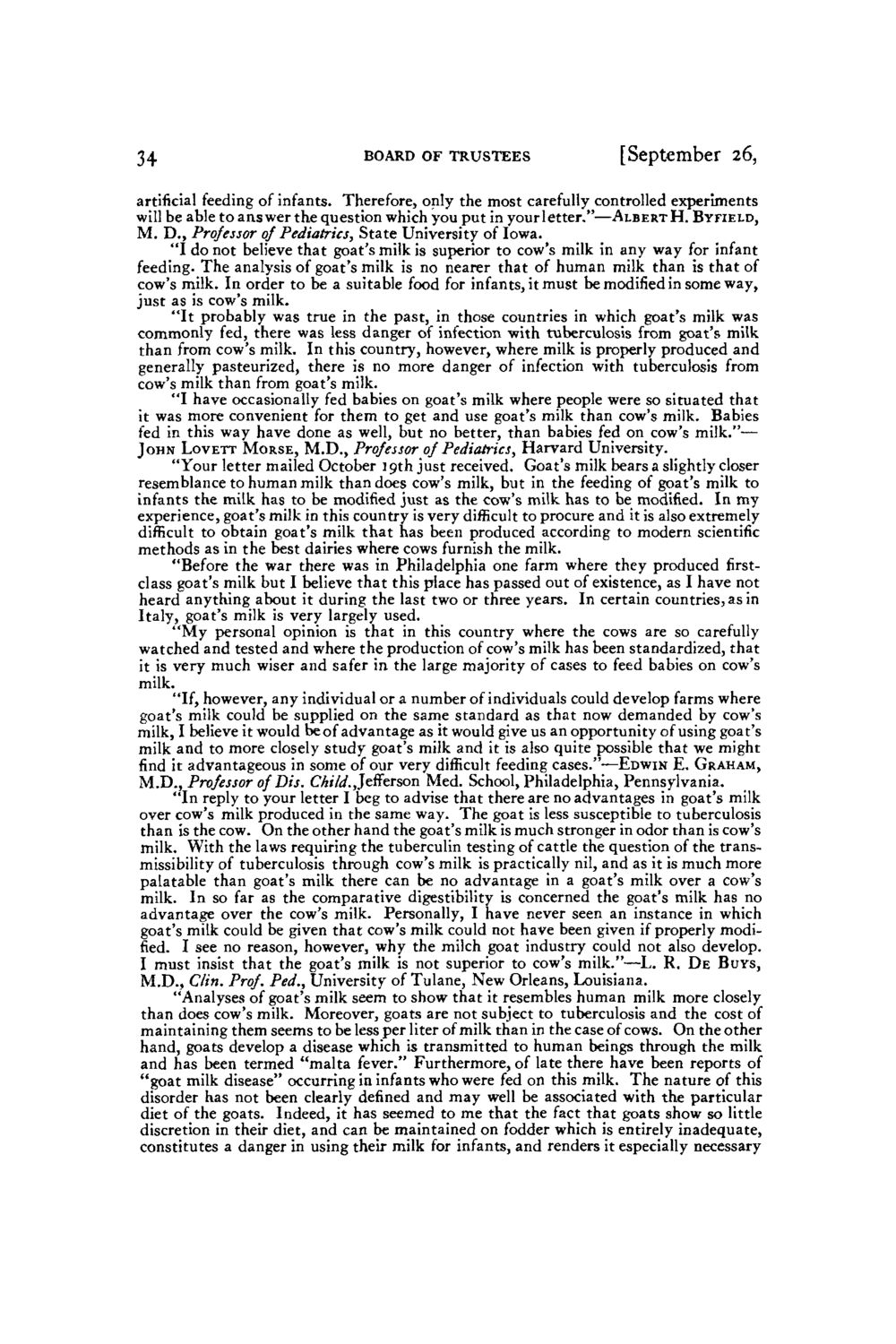| |
| |
Caption: Board of Trustees Minutes - 1926
This is a reduced-resolution page image for fast online browsing.

EXTRACTED TEXT FROM PAGE:
34 board of trustees [ S e p t e m b e r 26, artificial feeding of infants. Therefore, only the most carefully controlled experiments will be able to answer the question which you put in your letter."—Albert H . Byfield, M . D., Professor of Pediatrics, State University of Iowa. "I do not believe that goat's milk is superior to cow's milk in any way for infant feeding. The analysis of goat's milk is no nearer that of human milk than is that of cow's milk. In order to be a suitable food for infants, it must be modified in some way, just as is cow's milk. "It probably was true in the past, in those countries in which goat's milk was commonly fed, there was less danger of infection with tuberculosis from goat's milk than from cow's milk. In this country, however, where milk is properly produced and generally pasteurized, there is no more danger of infection with tuberculosis from cow's milk than from goat's milk. "I have occasionally fed babies on goat's milk where people were so situated that it was more convenient for them to get and use goat's milk than cow's milk. Babies fed in this way have done as well, but no better, than babies fed on cow's milk."-— John Lovett M o r s e , M.D., Professor of Pediatrics, Harvard University. "Your letter mailed October 19th just received. Goat's milk bears a slightly closer resemblance to human milk than does cow's milk, but in the feeding of goat's milk to infants the milk has to be modified just as the cow's milk has to be modified. In m y experience, goat's milk in this country is very difficult to procure and it is also extremely difficult to obtain goat's milk that has been produced according to modern scientific methods as in the best dairies where cows furnish the milk. "Before the war there was in Philadelphia one farm where they produced firstclass goat's milk but I believe that this place has passed out of existence, as I have not heard anything about it during the last two or three years. In certain countries, as in Italy, goat's milk is very largely used. " M y personal opinion is that in this country where the cows are so carefully watched and tested and where the production of cow's milk has been standardized, that it is very much wiser and safer in the large majority of cases to feed babies on cow's milk. "If, however, any individual or a number of individuals could develop farms where goat's milk could be supplied on the same standard as that now demanded by cow's milk, I believe it would beof advantage as it would give us anopportunity of using goat's milk and to more closely study goat's milk and it is also quite possible that we might find it advantageous in some of our very difficult feeding cases."—Edwin E. Graham, M.D., Professor of Dis. Child. Jefferson Med. School, Philadelphia, Pennsylvania. "In reply to your letter I beg to advise that there are no advantages in goat's milk over cow's milk produced in the same way. The goat is less susceptible to tuberculosis than is the cow. O n the other hand the goat's milk is much stronger in odor than is cow's milk. With the laws requiring the tuberculin testing of cattle the question of the transmissibility of tuberculosis through cow's milk is practically nil, and as it is m u c h more palatable than goat's milk there can be no advantage in a goat's milk over a cow's milk. In so far as the comparative digestibility is concerned the goat's milk has no advantage over the cow's milk. Personally, I have never seen an instance in which goat's milk could be given that cow's milk could not have been given if properly modified. I see no reason, however, w h y the milch goat industry could not also develop. I must insist that the goat's milk is not superior to cow's milk."—L. R. D e Buys, M.D., Clin. Prof. Ped., University of Tulane, N e w Orleans, Louisiana. "Analyses of goat's milk seem to show that it resembles human milk more closely than does cow's milk. Moreover, goats are not subject to tuberculosis and the cost of maintaining them seems to be less per liter of milk than in the case of cows. O n the other hand, goats develop a disease which is transmitted to human beings through the milk and has been termed "malta fever." Furthermore, of late there have been reports of "goat milk disease" occurring in infants who were fed on this milk. The nature of this disorder has not Indeed, it has maintained well be fact that entirely particular constitutes goats. diet, usingcan bemilk form amye on fodderrenders is goats shownecessary discretion in theirbeen clearly theirseemed toinfants, andassociated with the inadequate, diet of the a danger in and defined and that the which it especially so little
| |